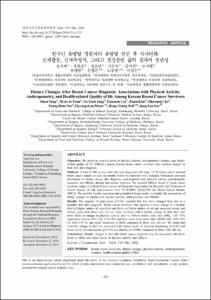한국인 유방암 경험자의 유방암 진단 후 식사변화: 신체활동, 신체측정치, 그리고 건강관련 삶의 질과의 연관성
- Keimyung Author(s)
- Cho, Ji Hyoung
- Department
- Dept. of Surgery (외과학)
- Journal Title
- 대한지역사회영양학회지
- Issued Date
- 2016
- Volume
- 21
- Issue
- 6
- Keyword
- breast cancer survivors; dietary change; physical activity; health-related quality of life; anthropometric features
- Abstract
- Objectives: We aimed to examine levels of physical activity, anthropometric features, and healthrelated
quality of life (HRQoL) among Korean breast cancer survivors who reported changes in
their diet after diagnosis.
Methods: A total of 380 women who had been diagnosed with stage I to III breast cancer and had
breast cancer surgery at least six months before the interview were included. Participants provided
information on dietary change after diagnosis, post-diagnostic diet, physical activity, anthropometric
measures, and HRQoL through face-to-face interview. We assessed HRQoL levels of breast cancer
survivors using a validated Korean version of European Organization for Research and Treatment of
Cancer Quality of Life Questionnaire Core 30 (EORTC QLQ-C30) and Breast Cancer Module
(BR23). We used the logistic regression and generalized linear models to identify the associations of
dietary changes in relation with physical activity, anthropometry, and HRQoL.
Results: The majority of participants (72.6%) reported that they have changed their diet to a
healthier diet after diagnosis. Breast cancer survivors who reported to have change to a healthy
diet had higher intakes of vegetables and fruits and lower intakes of red and processed meats, and
refined grains than those who did not. Also, survivors with a healthy change in their diet were
more likely to engage in physical activity (top vs. bottom tertile: odds ratio [OR], 1.85; 95%
confidence interval [95% CI], 1.02-3.36) and have lower body mass index (BMI) (OR, 0.90; 95%
CI, 0.82-0.98 for one kg/m2 increment in BMI) compared to those who did not. We found that
a healthy change in diet was associated with higher scores of physical functioning (p=0.02) and
lower scores of constipation (p=0.04) and diarrhea (p=0.006) compared to those who did not.
Conclusions: Healthy changes in diet after breast cancer diagnosis may be associated with lower
levels of BMI, and higher levels of physical activity and HRQoL.
- Alternative Title
- Dietary Changes After Breast Cancer Diagnosis: Associations with Physical Activity, Anthropometry, and Health-related Quality of life Among Korean Breast Cancer Survivors
- Keimyung Author(s)(Kor)
- 조지형
- Publisher
- School of Medicine
- Citation
- 송시한 et al. (2016). 한국인 유방암 경험자의 유방암 진단 후 식사변화: 신체활동, 신체측정치, 그리고 건강관련 삶의 질과의 연관성. 대한지역사회영양학회지, 21(6), 533–544. doi: 10.5720/kjcn.2016.21.6.533
- Type
- Article
- ISSN
- 1226-0983
- Appears in Collections:
- 1. School of Medicine (의과대학) > Dept. of Surgery (외과학)
- 파일 목록
-
-
Download
 oak-2017-0490.pdf
기타 데이터 / 437.7 kB / Adobe PDF
oak-2017-0490.pdf
기타 데이터 / 437.7 kB / Adobe PDF
-
Items in Repository are protected by copyright, with all rights reserved, unless otherwise indicated.